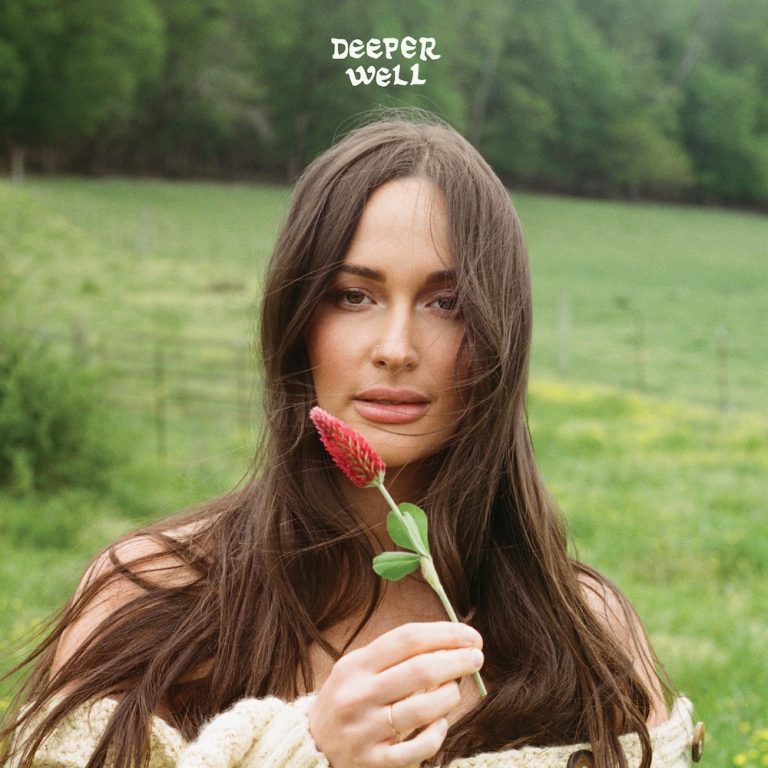Apparently the Saturn return is the new big thing everyone wants to talk about. You’d think that after the pandemic people would’ve slowly dropped the whole zodiac affinity, but it’s only grown in influence in some music circles. Kacey Musgraves has always been a hippie at heart, which drew in many fans. Her distinct sound and love for weed and Willie Nelson separated her from becoming any ordinary country star. However, on her fifth studio album Deeper Well, Musgraves becomes just ordinary – almost ‘blah’ worthy (at least by Kacey standards).
Some were scared by Star Crossed, Musgraves’ previous album, because of her overly adventurous spirit when it came to production styles. Deeper Well is much more stripped back than its predecessor – so stripped back that paint chips are no longer visible, just wood from a rustic cabin in the woods. The 70s folk infused album documents a post-post-divorceé thought process aka a “return to normalcy” aka Musgraves’ Saturn return.
Much of the project turns back to Western roots for its sonics. On “Jade Green”, an “El Condor Pasa”-styled flare shines down like a sunset showdown while Musgraves fidgets with her jade bracelet hoping to allure good karma. Lead single and title track “Deeper Well” finds her seeking enlightenment, removing herself from bad energy, waking-and-baking, and churning herself into depth profusion.
“Dinner With Friends” is a classic Kacey track worthy of love. Similarly to her raw, relatable repertoire of tracks, “Dinner With Friends” is one to examine. It starts with vivid scenes of her day to day before she contrasts this with choruses of sharp memories of a man she has loved. The track is an epic. “The shape of his heart / My shoes by his door / He loves me in all of the ways I’ve never felt love before.”
Trading in for soft contemporary radio-like songs, tracks like “Too Good To Be True” and “Sway” are forgettable. These tracks are melded together so desperately that it feels as if you lost 10 minutes of your life listening to static. Smuggled in between are “Moving Out” and “Giver/Taker”, other unpromising story songs.
It isn’t until the anthemic “Heart of the Woods” that you are released from the trance. It’s a song so filled with passion that you want to just rock out. When Musgraves takes this number on tour we’ll see lighters swaying in the air. The simple, short and sweet track is a return of the presence we felt earlier in “Oh, What A World ” from third studio album Golden Hour. “It’s in our nature / To look out for each other / In the heart of the woods,” she sings into folk nirvana.
Restraint is built into Musgraves’ soul as the softly composed album decomposes her artistry. Where Travie McCoy’s 2010 hit “Billionaire” was a fast, glamorous approach to hustling to luxury, Musgraves provides the counterpoint with her quiet rendition on the topic, “Lonely Millionaire”. The relaxed track spends dough on heartfelt reflections of her breadwinner status and how her partner will be more than money. The track makes a bare effort at wisdom and the almost jazzy R&B production mixed with Musgraves’ luscious vocals are the only reason worth staying, much like many of the tracks on the album.
Some of the lyrical ingenuity that Musgraves brings to the table has fallen a bit as well on Deeper Well. Not that everything she’s written has been as innovative as Susan Sontag, but her song-writing has been incredibly trustworthy. “The Architect” is an absolute banger for Christian radio moms, who actually might accidentally semi-spiritually fall inline on many of the tracks on Deeper Well (just don’t tell them she supports ‘the gays’). “Heaven is” can easily be misconstrued when Musgraves sings “The way you sound when you call my name / That’s what heaven is.” Pray the Christian rock groups don’t cover it.
Risk-taker has been one of the boxes checked Musgraves’ long list of talents, but on this album she doesn’t take many – none in fact. The only slightly unusual effort is “Anime Eyes”, a weird track that starts like the rest of the album but progresses into a sonic wonderland that isn’t clouded by bonfire smoke. Musgraves dusts off the vocoder she used on Golden Hour and decides to give the performance of her life when she decides to do a fast-talking sequence that ends with her announcing “Sailor Moon’s got nothin on me.”
Your 30s are where you make a stake in maturity that quantifies your adulthood. Adele’s 30 was one such record that documented this transition, and it has now been attempted by Musgraves. Her well of inspiration has always been deep, with songs about environmentalism, family troubles and small town gossip, but it seems now, when pressed too hard on the idea of maturity, Musgraves appears all too shallow, and no longer the three-dimensional character we loved and craved so much.

